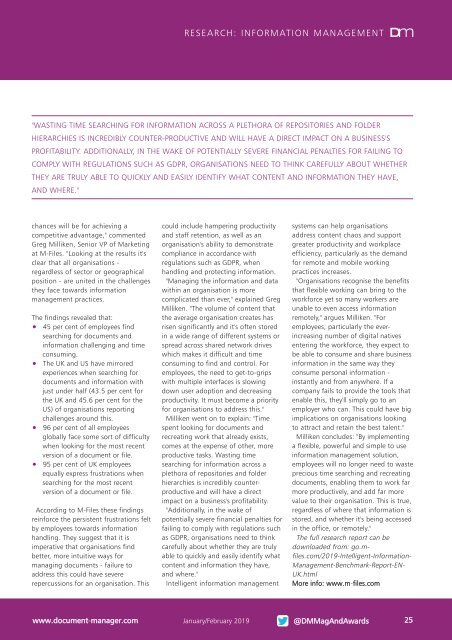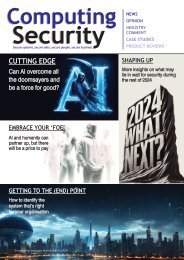DM1901
You also want an ePaper? Increase the reach of your titles
YUMPU automatically turns print PDFs into web optimized ePapers that Google loves.
RESEARCH: INFORMATION MANAGEMENT Dm<br />
"WASTING TIME SEARCHING FOR INFORMATION ACROSS A PLETHORA OF REPOSITORIES AND FOLDER<br />
HIERARCHIES IS INCREDIBLY COUNTER-PRODUCTIVE AND WILL HAVE A DIRECT IMPACT ON A BUSINESS'S<br />
PROFITABILITY. ADDITIONALLY, IN THE WAKE OF POTENTIALLY SEVERE FINANCIAL PENALTIES FOR FAILING TO<br />
COMPLY WITH REGULATIONS SUCH AS GDPR, ORGANISATIONS NEED TO THINK CAREFULLY ABOUT WHETHER<br />
THEY ARE TRULY ABLE TO QUICKLY AND EASILY IDENTIFY WHAT CONTENT AND INFORMATION THEY HAVE,<br />
AND WHERE."<br />
chances will be for achieving a<br />
competitive advantage," commented<br />
Greg Milliken, Senior VP of Marketing<br />
at M-Files. "Looking at the results it's<br />
clear that all organisations -<br />
regardless of sector or geographical<br />
position - are united in the challenges<br />
they face towards information<br />
management practices.<br />
The findings revealed that:<br />
45 per cent of employees find<br />
searching for documents and<br />
information challenging and time<br />
consuming.<br />
The UK and US have mirrored<br />
experiences when searching for<br />
documents and information with<br />
just under half (43.5 per cent for<br />
the UK and 45.6 per cent for the<br />
US) of organisations reporting<br />
challenges around this.<br />
96 per cent of all employees<br />
globally face some sort of difficulty<br />
when looking for the most recent<br />
version of a document or file.<br />
95 per cent of UK employees<br />
equally express frustrations when<br />
searching for the most recent<br />
version of a document or file.<br />
According to M-Files these findings<br />
reinforce the persistent frustrations felt<br />
by employees towards information<br />
handling. They suggest that it is<br />
imperative that organisations find<br />
better, more intuitive ways for<br />
managing documents - failure to<br />
address this could have severe<br />
repercussions for an organisation. This<br />
could include hampering productivity<br />
and staff retention, as well as an<br />
organisation's ability to demonstrate<br />
compliance in accordance with<br />
regulations such as GDPR, when<br />
handling and protecting information.<br />
"Managing the information and data<br />
within an organisation is more<br />
complicated than ever," explained Greg<br />
Milliken. "The volume of content that<br />
the average organisation creates has<br />
risen significantly and it's often stored<br />
in a wide range of different systems or<br />
spread across shared network drives<br />
which makes it difficult and time<br />
consuming to find and control. For<br />
employees, the need to get-to-grips<br />
with multiple interfaces is slowing<br />
down user adoption and decreasing<br />
productivity. It must become a priority<br />
for organisations to address this."<br />
Milliken went on to explain: "Time<br />
spent looking for documents and<br />
recreating work that already exists,<br />
comes at the expense of other, more<br />
productive tasks. Wasting time<br />
searching for information across a<br />
plethora of repositories and folder<br />
hierarchies is incredibly counterproductive<br />
and will have a direct<br />
impact on a business's profitability.<br />
"Additionally, in the wake of<br />
potentially severe financial penalties for<br />
failing to comply with regulations such<br />
as GDPR, organisations need to think<br />
carefully about whether they are truly<br />
able to quickly and easily identify what<br />
content and information they have,<br />
and where."<br />
Intelligent information management<br />
systems can help organisations<br />
address content chaos and support<br />
greater productivity and workplace<br />
efficiency, particularly as the demand<br />
for remote and mobile working<br />
practices increases.<br />
"Organisations recognise the benefits<br />
that flexible working can bring to the<br />
workforce yet so many workers are<br />
unable to even access information<br />
remotely," argues Milliken. "For<br />
employees, particularly the everincreasing<br />
number of digital natives<br />
entering the workforce, they expect to<br />
be able to consume and share business<br />
information in the same way they<br />
consume personal information -<br />
instantly and from anywhere. If a<br />
company fails to provide the tools that<br />
enable this, they'll simply go to an<br />
employer who can. This could have big<br />
implications on organisations looking<br />
to attract and retain the best talent."<br />
Milliken concludes: "By implementing<br />
a flexible, powerful and simple to use<br />
information management solution,<br />
employees will no longer need to waste<br />
precious time searching and recreating<br />
documents, enabling them to work far<br />
more productively, and add far more<br />
value to their organisation. This is true,<br />
regardless of where that information is<br />
stored, and whether it's being accessed<br />
in the office, or remotely."<br />
The full research report can be<br />
downloaded from: go.m-<br />
files.com/2019-Intelligent-Information-<br />
Management-Benchmark-Report-EN-<br />
UK.html<br />
More info: www.m-files.com<br />
www.document-manager.com<br />
January/February 2019<br />
@DMMagAndAwards<br />
25

















